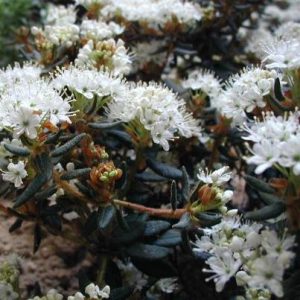 Ledum Palustre, also known as Marsh Tea or Wild Rosemary, is a flowering evergreen shrub that grows to a height of 1 metre.
Past uses have been in beer brewing, treatment of puncture wounds, and as a moth deterrent.
Ledum Palustre, also known as Marsh Tea or Wild Rosemary, is a flowering evergreen shrub that grows to a height of 1 metre.
Past uses have been in beer brewing, treatment of puncture wounds, and as a moth deterrent.
Homeopathically, Ledum is used for insect bites, puncture wounds, and cold swellings or bruises which feel much better for ice-cold applications. Chronic complaints such as rheumatism and
gout start in the feet and lower limbs first, moving up the body. They also improve with ice-cold applications. Ankles sprain easily. The person may be cross and surly.
Common Uses
When symptoms match, Ledum has been used for alcoholism, bites and stings, cold bruising, elephantiasis, gout, purpura,rheumatism, sprains, wounds.
Nash says:
- Rheumatism begins in feet and travels upward (Kalmia opposite).
- The swellings are pale, sometimes œdematous, and < at night, in the heat of the bed; uncovering or cold water relieves.
- Ecchymosis; “black eye” from a blow or contusion; better than Arnica.
- Rheumatism and rheumatic gout; joints become the seat of nodosities and “gout stones,” which are painful.
- Complaints of people who are cold all the time; lack of animal or vital heat; parts cold to touch, but not cold subjectively to patient.
- Punctured wounds by sharp-pointed instruments, rat bites, stings of insects, especially mosquitoes.
Hering says:
MIND.
- Desire for solitude.
- After nightmare, fears to go to sleep, lest she die.
- Inclined to be out of humor and angry ; vehement.
- Dissatisfied ; hates his fellow-beings.
SENSATIONS.
- Numbness and formication of the limbs.
TISSUES.
- Emaciation of suffering parts.
- Œdematous swellings of the whole body.
STAGES AND STATES.
- Pale, delicate women, who are always cold.
Lippe says:
MIND AND DISPOSITION.
- Inclines to be out of humor and angry.
- Vehement, angry mood ; vehemence.
- Dissatisfied ; hates his fellow-beings.
- Desire for solitude.
GENERALITIES.
- Gouty, rheumatic pains in the joints, aggravated by the heat of the bed and in the evening till midnight.
- Tense, hard swelling of the affected joints.
- Emaciation of the affected parts.
- Painful (gouty) nodosities on the joints.
CONDITIONS.
- Can not bear the heat of the bed, on account of the burning and heat of the limbs.
- Heat aggravates.
- Motion aggravates only the pains in the joints.
- The rheumatic pains in the lower limbs and ascend.
- Bad effects from alcoholic drinks.
Sources:
Textbook of Materia Medica by Adolph Lippe M.D. 1886 Publishers: AJ.Tafel
Constantine Hering. 1877. Condensed Materia Medica. Publishers: Boericke and Tafel
E. B. NASH. 1899 Leaders In Homoeopathic Therapeutics. Publishers: Boericke and Tafel

 SAHHO
クラシカルホメオパシー
&
ナチュラルヒーリング
SAHHO
クラシカルホメオパシー
&
ナチュラルヒーリング





















